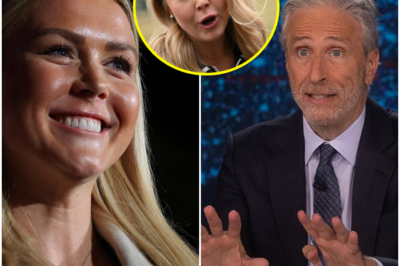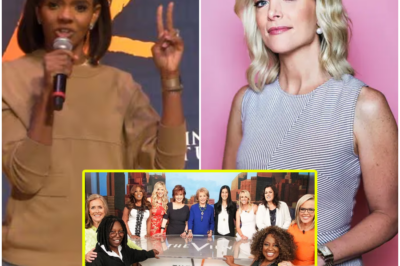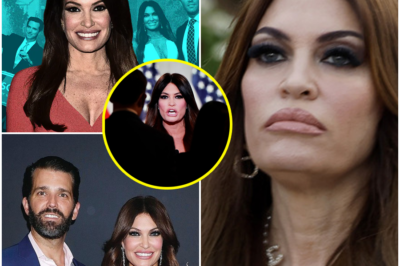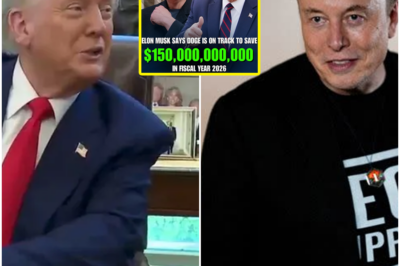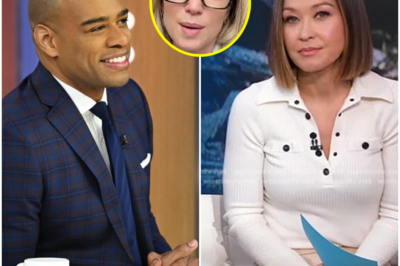🚨 SHOCKING: Karoline Leavitt BANS CNN’s Kaitlan Collins from Press Briefing After ‘Stupid’ Question—The Stunning Moment You Won’t Believe! 🚨

In a dramatic and unexpected move, Karoline Leavitt, the rising political star and press secretary, has banned CNN’s Kaitlan Collins from a recent press briefing after a heated exchange over what Leavitt called a “stupid question.” The fiery moment, which was caught on camera and quickly went viral, has left fans, media professionals, and pundits alike in disbelief as the two women engaged in an intense back-and-forth that led to Collins being escorted out of the room. What followed has sparked a major debate about press freedoms, accountability, and the role of the media in political discourse.
The Tense Exchange
The incident unfolded during a routine press briefing, where Leavitt, who has quickly risen to prominence for her outspoken approach to the press and her no-nonsense demeanor, was answering questions from reporters. The atmosphere was tense, with questions covering a range of political issues. However, the situation took a dramatic turn when Kaitlan Collins, CNN’s White House correspondent, posed a question that clearly struck a nerve with Leavitt.
Collins, known for her tough but often provocative questions, asked Leavitt about a controversial policy decision made earlier in the week. “Given the recent backlash on this policy, how do you justify the administration’s stance?” Collins asked, clearly expecting a substantive response.
But Leavitt, visibly irritated by the question, did not hold back. “That’s a stupid question,” Leavitt shot back, her voice firm. “You’re asking the same thing that’s been answered several times before. Maybe you should go back and read the transcripts from the previous briefings, Kaitlan. You’re wasting everyone’s time with these repetitive, misleading questions.”
The room went silent as the tension escalated, with Collins attempting to press further. But Leavitt, in a moment that left the media world stunned, simply said, “That’s it. You’re done. You can leave the briefing now.”
The Aftermath: Media Outrage and Support
The immediate fallout from this explosive incident has been massive, with reactions pouring in from all sides. Supporters of Leavitt’s decision argue that she was right to call out Collins for what they viewed as an attempt to provoke and mislead the press. “Kaitlan Collins has a history of pushing the envelope, but this was a step too far,” one social media user commented. “Leavitt is right to stand her ground. The media should be held accountable for wasting time with questions that don’t lead to productive dialogue.”
However, many in the media world have expressed their shock and outrage over Leavitt’s decision to ban Collins from the briefing. Critics argue that Leavitt’s actions represent an alarming attack on press freedoms and a blatant attempt to silence critical voices. “This is not how you treat journalists,” one veteran reporter tweeted. “If Leavitt can ban reporters from briefings simply because they ask difficult questions, it sets a dangerous precedent for the future of press freedom.”
The incident has ignited a fierce debate about the balance between press freedom and the responsibility of press secretaries to maintain order during briefings. Some commentators have raised concerns that Leavitt’s actions could have far-reaching consequences for future interactions between the press and political figures. “The press has a right to ask tough questions, and the public deserves answers, not silence,” said a media analyst.
Leavitt’s Defiant Stance
In a follow-up interview, Karoline Leavitt stood by her actions, defending her decision to call out Collins. “I’m not here to entertain frivolous questions or allow the press to mislead the public,” Leavitt said. “The question asked was not just stupid—it was a diversion from the real issues we need to be focusing on. I’m here to provide the truth, and that’s exactly what I intend to do.”
Leavitt’s refusal to back down in the face of criticism has only added to her growing reputation as a tough and unapologetic figure in politics. Known for her blunt style and bold rhetoric, she has quickly become a rising star in the political world, earning both admiration and skepticism in equal measure.
The Role of the Media in Political Discourse
The incident between Leavitt and Collins has brought attention to the role that the media plays in shaping political discourse and the boundaries between the press and public figures. As political leaders and their press teams become more vocal in their criticisms of the media, questions about the role of the press in holding government officials accountable are coming to the forefront.
“Press secretaries and public figures are entitled to defend their positions, but they must also respect the role of the press in holding them accountable,” one former White House correspondent noted. “This kind of confrontation does not build trust between the government and the media—it only deepens the divide.”
What’s Next for Leavitt and Collins?
As the fallout from this incident continues, it remains unclear whether Karoline Leavitt will face any repercussions for her decision to ban Kaitlan Collins from the briefing. For now, Leavitt seems undeterred, doubling down on her stance and continuing her work in the public eye.
For Collins, the incident has sparked a wave of support from her colleagues, who have expressed solidarity with her. “We stand behind Kaitlan,” one journalist wrote. “This was an attack on press freedom, and we need to make sure this doesn’t become a trend.”
Conclusion: A Divisive Moment in the Press Room
The explosive clash between Karoline Leavitt and Kaitlan Collins has set the stage for a wider conversation about the relationship between the press and public figures. While Leavitt’s defiant stand has won her support from some quarters, it has also raised important questions about accountability, press freedoms, and the treatment of journalists.
As the debate continues, both Leavitt and Collins remain at the center of this controversy, and it’s clear that their next moves will have a significant impact on the future of press interactions in the political landscape.
Stay tuned for more updates as this high-stakes situation unfolds, and as the media world watches closely to see how Leavitt’s actions shape the conversation around press freedoms and political transparency.
News
BREAKING: Basketball Legend Michael Jordan Criticizes Angel Reese, Claiming She Lacks Real Skills and Focuses on Flaunting Sexy Photos Online Instead of Improving Her Game! Fans Are Stunned by Jordan’s Public Remarks—What Sparked This Controversial Critique, and How Is Angel Reese Responding? Get the Full Scoop on the Shocking Statement from the Basketball Icon and What This Means for Angel Reese’s Career Moving Forward!
BREAKING: Basketball Legend Michael Jordan Criticizes Angel Reese, Claiming She Lacks Real Skills and Focuses on Flaunting Sexy Photos…
SHOCKING: Jon Stewart Mocked Karoline Leavitt but Immediately Faced Her Ruthless Comeback—A Statement That Exploded All Over American Social Media! What Sparked This Fiery Exchange Between the Two? Fans Are Left Stunned by Leavitt’s Powerful Response to Stewart’s Criticism. Get the Full Scoop on the Explosive Moment That Has Everyone Talking About Karoline Leavitt’s Bold and Unapologetic Reaction!
SHOCKING: Jon Stewart Mocked Karoline Leavitt but Immediately Faced Her Ruthless Comeback—A Statement That Exploded All Over American Social…
CBS Unleashes a $700 Million Bombshell—Megyn Kelly and Candace Owens Set to Rival The View with Explosive New Morning Show! Sources Claim It’s the Boldest Daytime TV Move Yet, Already Stirring Wild Reactions from Liberals. What’s Really Behind This Jaw-Dropping $700 Million Deal, and How Will It Change the Landscape of Morning Television? Get the Full Scoop on CBS’ Game-Changing Move!
CBS Unleashes a $700 Million Bombshell—Megyn Kelly and Candace Owens Set to Rival The View with Explosive New Morning…
People Suddenly Understand the Real Reason Kimberly Guilfoyle’s Fiancé Dumped Her After Unfiltered Photo Exposes Shocking Details! Fans Are Stunned by the Unseen Side of Guilfoyle’s Relationship. What Was Revealed in the Photo, and Why Did It Lead to the Breakup? Get the Full Story Behind the Unfiltered Image That Changed Everything About Kimberly Guilfoyle’s Personal Life and Her Relationship with Her Fiancé.
People Suddenly Understand the Real Reason Kimberly Guilfoyle’s Fiancé Dumped Her After Unfiltered Photo Exposes Shocking Details! Fans Are…
Elon Musk Announces DOGE Will Save the U.S. Government Over $150 Billion by Cutting Waste and Fraud in Fiscal 2026! Fans Are Stunned by His Bold Prediction. How Will DOGE Achieve This? Get the Full Inside Scoop on Musk’s Plan!
Elon Musk Announces DOGE Will Save the U.S. Government Over $150 Billion by Cutting Waste and Fraud in Fiscal…
BREAKING: GMA3 Faces Major Shakeup—ABC Boss Plans to Ax DeMarco Morgan and Eva Pilgrim by Summer! What’s Behind the Shocking Rumors, and Why Are the Popular Hosts Being Let Go? Fans Are Left Stunned by the Potential Changes to Good Morning America’s Lineup. Get the Full Story on What’s Behind the Shakeup, What This Means for GMA, and Who Might Be Replacing Them!
BREAKING: GMA3 Faces Major Shakeup—ABC Boss Plans to Ax DeMarco Morgan and Eva Pilgrim by Summer! What’s Behind the…
End of content
No more pages to load


